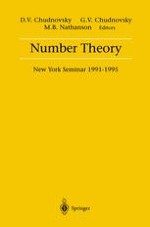1996 | OriginalPaper | Buchkapitel
On the Sum of the Reciprocals of the Differences Between Consecutive Primes
verfasst von : Paul Erdös, Melvyn B. Nathanson
Erschienen in: Number Theory: New York Seminar 1991–1995
Verlag: Springer US
Enthalten in: Professional Book Archive
Aktivieren Sie unsere intelligente Suche, um passende Fachinhalte oder Patente zu finden.
Wählen Sie Textabschnitte aus um mit Künstlicher Intelligenz passenden Patente zu finden. powered by
Markieren Sie Textabschnitte, um KI-gestützt weitere passende Inhalte zu finden. powered by
The infinite series $$\sum\limits_{{n = 2}}^{\infty } {\frac{1}{{n{{{(\log \log n)}}^{c}}\log n}}}$$ converges if and only if c > 1. Let pn denote the n-th prime number. By the prime number theorem, $$\sum\limits_{{i = 1}}^{n} {({{p}_{{i + 1}}} - {{p}_{i}}) = {{p}_{{n + 1}}} - 2 \sim n \log n,}$$ and so the difference between consecutive primes is on average logn. This suggests the question: For what values of c does the series $$\sum\limits_{{n = 2}}^{\infty } {\frac{1}{{n{{{(\log \log n)}}^{c}}({{p}_{{n + 1}}} - {{p}_{n}})}}}$$ converge? We shall prove convergence for c > 2, and give a heuristic argument why the series must diverge for c = 2.
